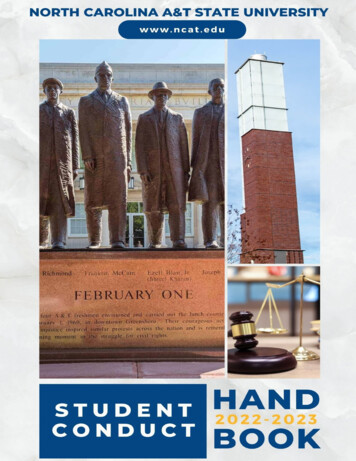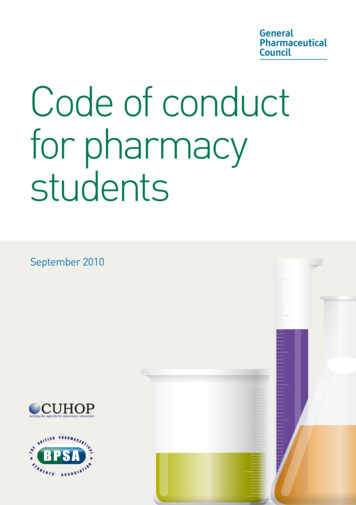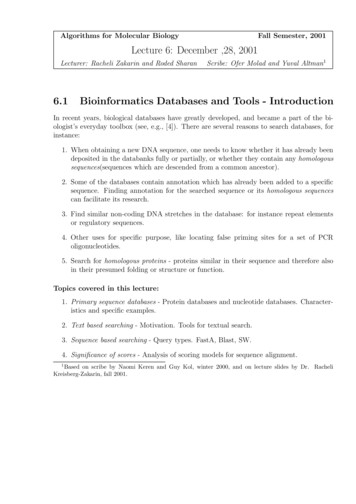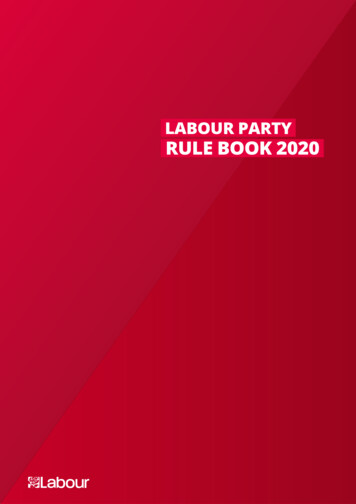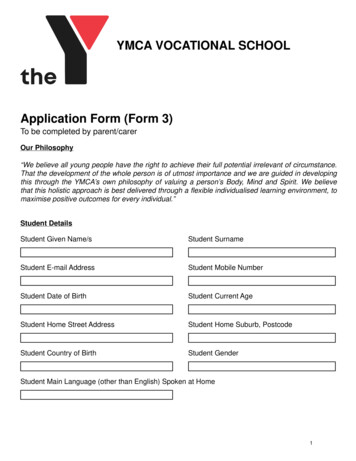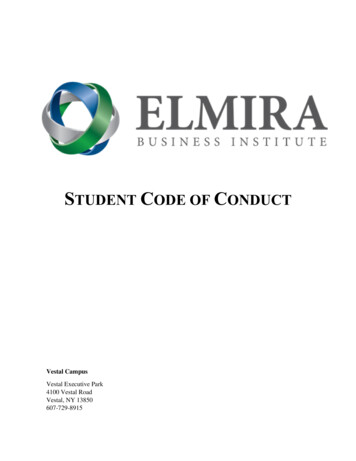
Transcription
STUDENT CODE OF CONDUCTVestal CampusVestal Executive Park4100 Vestal RoadVestal, NY 13850607-729-8915
Student Code of ConductWhile every effort is made to provide accurate and current information, Elmira Business Institute (EBI) reserves theright to change, without notice, statements, policies, and rules described in the Student Code of Conduct. Such changestake effect whenever EBI officials deem necessary.Student ResponsibilityEach student at EBI is responsible for reviewing, understanding, and abiding by all EBI policies, rules, procedures,and expectations as described in this Student Code of Conduct and other policy documents.Non-discrimination PolicyEBI does not discriminate on the basis of race, sex, color, national origin, creed, sexual orientation, or mental orphysical disability in its programs, activities, or employment and is committed to providing equal opportunities.This document last revised December 2019.
TABLE OF CONTENTSPageStudent Code of Conduct .2Violations of Code of Conduct .2Reporting Violations .4Disciplinary Procedures .5Appeals Process .7Possible Consequences and/or Sanctions.8Sexual Misconduct Policy .10Terms and Definitions.11Prohibited Behavior .17How to Report .18Resources, Support Services, and Protection for Students .22Disciplinary Process.26Student Rights .27Incident Report Form for Code of Conduct Violations .30
STUDENT CODE OF CONDUCTElmira Business Institute (EBI) expects that its students will conduct themselves at all timesin accordance with the guiding principles outlined in this Student Code of Conduct, other EBIpolicies, and applicable New York State and federal laws. Students are responsible for makingtheir own decisions and are expected to take responsibility for decisions made.Authority over student conduct is vested in EBI’s Office of Student Affairs. The Senior VicePresident has delegated authority to each Campus Director to take action for the purposes ofensuring the protection of the EBI community’s safety and well-being, preserving peace and orderon campus, and disciplining students who violate expectations of appropriate behavior.Violations of Code of ConductThe following behaviors are considered specific violations of the Student Code of Conduct.Violations of the Student Code of Conduct can occur both on-campus and off-campus and mayalso include other unacceptable conduct not specifically listed below. Sexual misconducto Including but not limited to: rape; sexual assault; stalking; domestic violence;dating violence; sexual harassment; unwanted sexual contact; and other sexualviolence. See EBI’s full Sexual Misconduct Policy on page 10.Academic misconducto Including but not limited to: plagiarism; cheating; forgery and/or alteration ofinstitutional records; unauthorized use of electronic devices during testing;disruptive classroom behavior; and other forms of academic dishonesty.Abusive, threatening, and/or dangerous behavioro Including but not limited to: verbal abuse; threatening behaviors or statements;conduct which endangers the health, safety, or welfare of any person; engaging infighting and/or other violent behavior; bullying, harassment, and/or hazing;possession, use, storage, or sale of firearms and/or weapons on campus;unauthorized surveillance of any person; intentionally making a false report of anemergency; and other behaviors that would reasonably endanger, alarm, threaten,or harass any personMisuse, theft, damage, defacement, and/or destruction of EBI propertyo Including but not limited to: arson; tampering with fire safety equipment and/ordevices; misuse and/or abuse of EBI computers, email communication systems,information technology networks, or other technology systems; and other damagingconductPossession, use, storage, or sale of alcohol and/or drugs while on campus property or thepremises of academic field sites and clinical placements, and/or while participating inacademic field work, EBI-affiliated volunteer opportunities, events sponsored by oraffiliated with EBI, or other events at which an individual is serving in a student capacityor as a representative of EBI2
Smoking, vaping, and/or the use, burning, or carrying of a lighted cigarette, cigar, pipe,e-cigarette, or any other matter or substances containing tobacco and/or nicotine on Collegeproperty outside of designated campus smoking areasGambling on College propertyNon-cooperation or non-compliance with instructions, directives, or reasonable requestsfrom EBI officials, campus security officers, or law enforcement officersNon-cooperation or non-compliance with any part of the Student Code of Conductdisciplinary process, including adherence to interim measures and/or sanctions imposedunder the Student Code of Conduct disciplinary processFurnishing false information to any EBI official, faculty member, or office, and other actsof dishonestyMisuse, alteration, or forgery of any EBI document, record, or instrument of identificationUnauthorized entry or use of EBI premisesUnauthorized possession, use, or duplication of keys or access codes to any EBI premisesBreaching the peace of the EBI campus, community, operations, and/or events, includingexposing others to conduct that is disorderly, harassing, annoying, uncivil, indecent, lewd,or otherwise inappropriate for members of an academic community, and/or inciting,coercing, or aiding others in doing soBringing the name of EBI into disrepute, including engaging in conduct that reflects poorlyon EBI and/or making false statements or false allegations about EBI, EBI officials, or theEBI communityEngaging in other conduct that reflects insufficient maturity to be a member of an academiccommunity and/or negatively impacts the normal pursuit of academic, administrative,extracurricular, or personal activities when such conduct is recurring, progressive,escalating, or otherwise an ongoing or repeat disruption to EBI operationsOther violations of EBI policies or sanctions and/or other violations of federal law or Statelaw that reflect poorly on a student’s judgment and character3
Reporting Violations of Code of ConductAll students, faculty, and staff have the right to file a report with EBI regarding a potential or actualviolation of the Code of Conduct. Potential and actual violations of the Code of Conduct will beprocessed under the Disciplinary Procedures for Violations of Code of Conduct described onthe next page.Students can file a report regarding a potential or actual violation of the Code of Conduct by filing anincident report with their Campus Director or, in the event of a sexual misconduct incident, with theircampus Title IX Coordinator (see page 18 for more information). A blank incident report form isprovided at the end of this Student Code of Conduct policy book. Hard copies of blank incidentreport forms are also available at the Security Desk and in the Academic Achievement Center(AAC) lab. Hard copy incident reports can be submitted in-person at the office of the Campus Directoror Title IX Coordinator. Students can also download an incident report form at s/ which can be submitted in-person or via email to report@ebi.edu .Students reporting instances of sexual misconduct – whether they are the victim, a friend, or awitness/bystander – can make confidential and/or anonymous reports if they prefer to do so.While the policies described in this book pertain only to students who violate EBI’s Student Codeof Conduct, in the event that sexual misconduct has been committed by anon-student (such as a faculty member, staff member, other member of the EBI community,non-member of the EBI community, or unknown person or stranger), students may still report theincident to EBI and receive support and protection. In any instance of sexual misconduct, a studenthas the right to report the incident to EBI, to campus security, to local law enforcement, to theState police, to any combination of those authorities, or to not report the incident at all. Detailedinformation regarding EBI’s sexual misconduct policy – including how to make a confidentialand/or anonymous report, what a student’s rights are under federal and New York State law, andhow to access support services – can be found on page 10 of this policy book in the section entitledSexual Misconduct Policy. Students can also speak privately with their campus Title IXCoordinator, by visiting their campus office or by contacting them directly at the telephone numberor email address provided on page 15.Where a student’s complaint does not pertain to a potential or actual violation of the Code ofConduct (such as a dispute over academic accommodations, a complaint against a professorregarding course grades, or other non-conduct-related academic or administrative dispute), thestudent will be informed that his/her complaint will not be processed under the DisciplinaryProcedures for Violations of Code of Conduct; instead, the student’s complaint will be handled inaccordance with the procedures described in the EBI College Catalog: https://ebi.edu/disclosures/.4
Disciplinary Procedures for Violations of Code of ConductReports of potential and actual violations of the Code of Conduct, as listed and described above,will be processed as follows. All written notifications referenced below will be provided by EBIofficials to students via the EBI email system.All accused students are entitled to a presumption of ‘not responsible’ (not guilty), and allprocesses will be conducted in a fair, impartial, thorough, and timely manner. At all times, theburden of proof is on EBI to establish that the alleged violation of this policy was committed bythe student in question. The standard of evidence required in both the Student Conduct Hearingand in the Appeal Hearing, if one is sought, is a preponderance of evidence. ‘Preponderance ofevidence’ means that the relevant Hearing Panel must decide in favor of the party that, as a whole,has the stronger evidence that the violation was or was not committed, however slight the edgeover the other party’s evidence may be. ‘Preponderance of evidence’ is sometimes described as‘more likely than not’ or ‘51% probability’. The evidence should be sufficient to incline a fair andimpartial mind to one side of the issue over the other, but it is not necessary for that mind to becompletely free from all reasonable doubt. ‘Preponderance of evidence’ is a different and lesserstandard of evidence than that used in criminal proceedings; rather, it is the standard of evidenceoften used in civil court proceedings. Please note that certain aspects of EBI’s disciplinaryprocedures are applicable only to incidents involving sexual misconduct. If you have anyquestions regarding these procedures, please contact your Campus Director. All submitted incident reports will be reviewed by the Campus Director (or his/herdesignee).o Students who have submitted a confidential and/or anonymous incident report inregard to an incident of sexual misconduct can rest assured that the CampusDirector is a member of the College’s Title IX team and, accordingly, will maintainthe student’s privacy to the utmost extent. For more information on how to file aconfidential and/or anonymous incident report regarding an incident of sexualmisconduct, see EBI’s full Sexual Misconduct Policy on page 10.If appropriate, the Campus Director (or another member of the Title IX team, if applicable)will conduct or direct an investigation into the incident reported.o Students who have reported an incident of sexual misconduct have the option ofrequesting that EBI not conduct an investigation; however, under certaincircumstances, EBI may determine that an investigation is necessary to protect thehealth and safety of other students. When EBI determines that an investigation isnecessary, the student who submitted the incident report will be notified in writing.o Students who have anonymously submitted a report regarding an incident of sexualmisconduct should be aware that their anonymity may inhibit EBI’s ability toconduct a full investigation of the incident and/or communicate with the studentregarding actions taken.Any investigation conducted will be done so in a fair, impartial, thorough, and timelymanner. If, upon investigation, it is determined that a student may have violated theStudent Code of Conduct, the Campus Director will file student conduct charges againstthe student and schedule a Student Conduct Hearing on the alleged violation, to be held ata campus location and date determined by the Campus Director. The date selected by theCampus Director will be timely in that it will provide an accused student a reasonable5
amount of time to prepare for the Student Conduct Hearing while also not constituting anunreasonable delay in resolving the charges. When an alleged violation involves more thanone student, or when more than one violation is alleged to have been committed by astudent, the Campus Director may determine, in his/her discretion, to schedule separateStudent Conduct Hearings.When the Campus Director files student conduct charges against a student,the Campus Director will promptly notify such student in writing of the specific violationin question, the date on which the violation allegedly occurred, possible consequencesand/or sanctions against the student for such violation, information regarding how thestudent can dispute the violation alleged (including the date, time, and location of a StudentConduct Hearing at which the student will be entitled to present evidence), and what (ifany) temporary measures will be imposed upon the student while the Student ConductHearing is in progress (e.g., temporary suspension). Where the alleged violation involvessexual misconduct, the written notice will also notify the student of his/her right to beaccompanied at the Student Conduct Hearing by an advisor of his/her choice.The Student Conduct Hearing will be conducted in a fair, impartial, and thorough manner.The Student Conduct Hearing will be presided over by a panel of impartial individualsselected by the Campus Director. The panel will hear all evidence presented on the allegedviolation. Where the alleged violation involves sexual misconduct, the accused studentwill have the opportunity to present evidence in his/her defense and to be accompanied byan advisor of his/her choice, and the individual who reported the incident and/or wassubjected to the alleged sexual misconduct may, if he/she desires, also have the opportunityto present evidence of the incident and to be accompanied by an advisor of his/her choice.o Important note regarding advisors: Students are welcome, but not obligated, to beaccompanied by an advisor during disciplinary hearings. Students are entitled tohave their advisor sit with them and may confer with their advisor before, during,and after proceedings – however, advisors are not allowed to directly participate atany point during the proceedings. Any arguments or evidence presented during ahearing must be presented by the student himself/herself. In the event that a studentcannot attend a proceeding or a portion thereof, the advisor is not allowed to attendor participate on the student’s behalf.After all evidence has been presented in the Student Conduct Hearing, the panel will rendera decision as to whether the accused student is ‘responsible’ (guilty) or ‘not responsible’(not guilty) for the violation and will impose consequences and/or sanctions on an accusedstudent found ‘responsible’, if appropriate. If the accused student fails to or declines toattend the Student Conduct Hearing, the Student Conduct Hearing will be held without theaccused student present and the panel may reach a decision of ‘responsible’ and imposeconsequences and/or sanctions even in the accused student’s absence. A full and fair recordof the Student Conduct Hearing will be preserved and maintained by the College for fiveyears.The Student Conduct Hearing panel’s decision regarding the accused student’sresponsibility and the imposed consequences/sanctions (if any), including the rationale insupport of such consequences/sanctions, will be provided to the accused student in writingwithin five days of the Student Conduct Hearing. Where the alleged violation involvessexual misconduct, the individual who reported the incident and/or was subjected to the6
alleged sexual misconduct will also receive a written copy of the same information on thesame day as the accused student.In addition to the written notification of the panel’s decision and the imposedconsequences/sanctions (if any), an accused student found ‘responsible’ will also receivewritten notice regarding his/her right to appeal the panel’s decision and/or imposedconsequences/sanctions. Where the alleged violation involves sexual misconduct, theindividual who reported the incident and/or was subjected to the alleged sexual misconductwill also receive a written copy of the same information on the same day as the accusedstudent.An accused student found ‘responsible’ may commence his/her appeal by following theprocedures described in the paragraphs titled ‘Appeals Process’ below. Where the allegedviolation involves sexual misconduct, an appeal may also be commenced by the individualwho reported the incident and/or was subjected to the alleged sexual misconduct byfollowing the same procedures. In the event an appeal is requested in regard to an allegedviolation involving sexual misconduct, the Student Conduct Hearing panel’s decision willbe protected from public release by the College until the Appeals Process is complete andfinal, unless the law requires otherwise; however, the students involved may choosewhether or not to discuss or disclose the outcome of the Student Conduct Hearing.If a student does not commence an appeal within the required timeframe (i.e., five businessdays from receiving written notification of the Student Conduct Hearing panel’s decision),then the Student Conduct Hearing panel’s decision will be final.Appeals ProcessAny student found ‘responsible’ by a Student Conduct Hearing panel may appeal the panel’sdecisions, including its determination of responsibility and/or the consequences/sanctionsimposed. Where the alleged violation involves sexual misconduct, an appeal may also berequested by the individual who reported the incident and/or was subjected to the alleged sexualmisconduct.If a student wishes to appeal the decision of the Student Conduct Hearing panel,whether in regard to its determination of responsibility or its imposed consequences/sanctions,the student must submit a written request for an appeal to the President within five business days(i.e., weekdays) of receiving written notification of the panel’s decision.The written request for appeal must include a brief statement of whether the student objects to theStudent Conduct Hearing panel’s determination of responsibility, the imposedconsequences/sanctions, or both, as well as include a brief statement of the student’s argument(s)as to why the Student Conduct Hearing panel’s determination of responsibility and/or imposedconsequences/sanctions were inappropriate. Upon receiving the student’s written request forappeal, the President will schedule an Appeal Hearing, to be held in a timely manner at a campuslocation and date determined by the President. Upon scheduling the Appeal Hearing, the Presidentwill provide written notification of the location, date, and time to the students involved.The Appeal Hearing will be conducted in a fair, impartial, and thorough manner. The AppealHearing will be presided over by a panel of impartial individuals selected by the President. No7
individual who served on the Student Conduct Hearing panel is allowed to serve on the AppealHearing panel. The panel will hear all arguments presented in regard to whether the StudentConduct Hearing panel’s decisions were appropriate. After all arguments have been presented,the Appeal Hearing panel will render a decision on the appealed issues and, if appropriate, imposerevised consequences/sanctions on a student. Within five days of the Appeal Hearing, thestudent(s) involved will receive written notification of the Appeal Hearing panel’s decision andthe rationale for such decision. The Appeal Hearing panel’s decisions are final and are not subjectto further appeal.Possible Consequences and/or SanctionsThe following possible sanctions may be imposed as a result of a Student Conduct Hearing and/oran Appeal Hearing. In addition, if at any point (whether during or prior to any such hearing) astudent’s presence on campus creates a threat to the health, safety, and/or well-being of otherstudents or other members of the EBI community, EBI reserves the right to immediately suspendthat student from campus until the time of the Student Conduct Hearing and/or Appeal Hearing.The following list of possible consequences/sanctions is not exhaustive, and theseconsequences/sanctions may be imposed singularly or in any combination. Any combination ofthe following sanctions, as well as different and/or additional consequences or sanctions, may beimposed by a Student Conduct Hearing panel and/or Appeal Hearing panel as the panel membersmay deem appropriate. No Consequences/Sanctions: Where the Student Conduct Hearing panel (and/or theAppeal Hearing panel, in the event an appeal is sought) determines that a student is ‘notresponsible’, the student conduct charges against the student will be dismissed and thestudent’s name will be cleared.Verbal Warning: A discussion with the student about the incident, with no writtennotification issued.Written Warning: A written notice to the student stating that his/her conduct is in violationof EBI policies and that the continuation of said conduct during a stated period of time maybe cause for more serious disciplinary action, such as community service, probation, orsuspension.Loss of Privileges: A stated temporary loss of campus privileges, such as but not limitedto the ability to attend special events or participate in extracurricular activities, set inwriting for a stated period of time.Fine: Financial penalty for committing prohibited conduct.Restitution: Financial reimbursement for damage to property.Community Service: A stated number of hours, set in writing, of donated servicecommensurate with the conduct violation.Referral for Mandatory Counseling: A stated number of counseling sessions, set in writing,commensurate with the conduct violation. The counseling sessions may be required to be8
completed with an external counseling professional, as appropriate. The costs of any suchcounseling services will be paid by the College.Referral for Mandatory Mental Health Assessment: A required evaluation by anappropriate mental health professional of the College’s choosing. The costs of any suchevaluation will be paid by the College.Disciplinary Probation: A stated period of time, set in writing, during which the student isexpected to demonstrate appropriate conduct as a member of the College community.Failure to demonstrate appropriate conduct may subject the student to furtherconsequences/sanctions, such as community service and/or suspension.Disciplinary Suspension: A stated period of time, set in writing and not to exceed oneacademic year, during which the student is excluded from classes and/or campus activities.Upon the expiration of the suspension period, the student may be subjected to a probationperiod during which the student is expected to demonstrate appropriate conduct as amember of the College community. This sanction automatically results in a TranscriptNotation sanction.Disciplinary Dismissal from the College (Expulsion): Permanent termination of status asa student of the College. This sanction automatically results in a Transcript Notationsanction.Transcript Notation: Where a student is found ‘responsible’ for a violation involvingviolence, including sexual violence and/or sexual misconduct, and is then subjected toeither suspension or expulsion from the College, the student’s transcript will automaticallyreceive a notation stating “Suspended after a finding of responsibility for a Code ofConduct violation” or “Expelled after a finding of responsibility for a Code of Conductviolation,” as appropriate. Where a student withdraws from the College while such chargesare pending, the student’s transcript will receive a notation stating “Withdrew with conductcharges pending.” Transcript notations regarding expulsion, suspension, and withdrawalshall be permanent.Other consequences and/or sanctions as deemed appropriate by the Student ConductHearing panel and/or Appeal Hearing panel.9
SEXUAL MISCONDUCT POLICYElmira Business Institute (EBI) is committed to promoting a learning and working environmentwhere all members of the EBI community feel safe and respected. Acts of sexual misconduct arecontrary to EBI’s educational mission and values, are harmful to others, and will not be toleratedby EBI. This policy prohibits sexual violence, sexual harassment, sexual misconduct, and otherrelated offenses in all EBI programs and activities. Conduct prohibited by this policy may alsoviolate federal and/or New York State laws enforced through the criminal justice system.Individuals are free to pursue action under this policy and through the criminal justice systemsimultaneously. EBI takes seriously all reports of sexual misconduct and promises to promptlyand fairly respond to all reports of misconduct in a manner intended to eliminate the misconduct,prevent its recurrence, and address its impact on affected individuals and the EBI community.All EBI proceedings conducted in regard to alleged violations of this policy will be done so in atimely and equitable process that provides adequate notice and a meaningful opportunity for allparties to be heard.Scope of Sexual Misconduct PolicyThis policy intends to address conduct prohibited under federal laws, including Title IX, the CleryAct, and the Violence Against Women Act, as well as under New York State law, specifically its“Enough Is Enough” law (Education Law 129-B).This policy applies to all EBI community members, including students, faculty, staff, otheremployees, and independent contractors. EBI will receive and address reports received from anyindividual, whether or not he/she is affiliated with EBI, that an EBI community member hasviolated this policy. Vendors, contractors, visitors, and others who conduct business with the EBIor on EBI property are likewise expected to comply with this policy. The prohibitions andprotections in this policy apply regardless of race, color, national origin, religion, creed, age,disability, sex, gender identity or expression, sexual orientation, familial status, pregnancy,predisposing genetic characteristics, military status, domestic violence victim status, or criminalconviction.The prohibitions and protections in this policy apply regardless of whether the violation occurs oncampus or off campus. Members of the EBI community who commit acts of sexual misconductwill be disciplined appropriately and pursuant to EBI policy. This policy book describesprotections specifically for students who are subjected to sexual misconduct as well as disciplinaryprocedures specifically relevant to students who commit sexual misconduct. The actions EBI isempowered to take against an individual who commits sexual misconduct may vary or be limitedwhen that individual is not a member of the EBI community; however, whenever a member of theEBI community is subjected to sexual misconduct, regardless of the status of the individual whocommitted it, EBI will continue to provide support, resources, and protection to the affectedcommunity member. At all times, EBI will cooperate with and assist in law enforcementinvestigations whenever appropriate and requested to do so.10
Terminology and DefinitionsThe following terms are used throughout this policy book and may be heard during conversationswith EBI officials and/or during student conduct proceedings. Due to the sensitive and sometimesviolent nature of incidents involving sexual misconduct, the following definitions are provided forinformational use by students and for guidance in the investigation and processing of allegedviolations. It is possible that a particular action may constitute sexual misconduct even if notspecifically mentioned in these definitions.If you have any questions about what these terms mean or whether they apply to certain situations,p
While every effort is made to provide accurate and current information, Elmira Business Institute (EBI) reserves the right to change, without notice, statements, policies, and rules described in the Student Code of Conduct. Such changes take effect whenever EBI officials deem necessary. Student Responsibility




